Investors got very familiar with the notion of an inverted yield curve in 2019, especially when you bring the word “recession” into the mix. However, some market experts think the tried-and-tested recession signal could be sending a false alarm.
“I don’t believe there is a recession coming,” said Alex Ely, chief investment officer for U.S. small to mid-cap growth equity at Macquarie Investment Management. “Consumers are not extended. Unemployment levels are low and wage growth is high so we are optimistic.”
There’s certainly a dichotomy that exists between what the market is doing and how the economic fundamentals are stacking up. On one hand, the major indexes are sensitive to U.S.-China trade war movements and on the other, unemployment levels are at historically low levels—a sign that the economy isn’t hinting at a recession.
Even a data-dependent Federal Reserve is hesitant to continue lowering interest rates according to their last meeting’s minutes. The central bank cut rates for a third consecutive time, but weren’t definitive on further rate cuts.
“Two things stood out to me with their last decision. First, rather than stressing the downside risks to growth and inflation, their outlook is more balanced—so they’ve cut this time with a view of remaining on hold for the foreseeable future. And second, there’s a view that rates are now appropriately accommodative, which means they think they’ve bought enough insurance going to stay on hold into 2020,” said Edward Al-Hussainy, senior interest rate and currency analyst for Columbia Threadneedle.
That isn’t to say, however, that Al-Hussainy doesn’t sense that the economy is slowing. Especially when it comes to the global landscape, there is substantiated evidence of slowing global growth in nations like Europe and Japan.
“I think, at best, that things in the U.S. economy are deteriorating at a slower pace,” says Al-Hussainy. Outside of the U.S., in places like Europe and Japan, economic data is lackluster. Moreover, there’s no certainty of the phase 1 China-U.S. mini-deal getting approved. “I’m fairly comfortable saying that additional cuts may be possible,” he says.
While the economy continues to hum, the bond markets aren’t downplaying the importance of the inverted yield curve just yet. There is still a penchant for yield when it comes to the credit market, especially since Treasury yields have sunk to lows.
“Credit is definitely flowing into the economy,” says Brett Lewthwaite, chief investment officer for Macquarie fixed income. “The bond market rarely gets recessions wrong, but the chase for yield may be keeping the credit markets going.”
For more market trends, visit ETF Trends.

